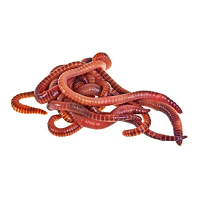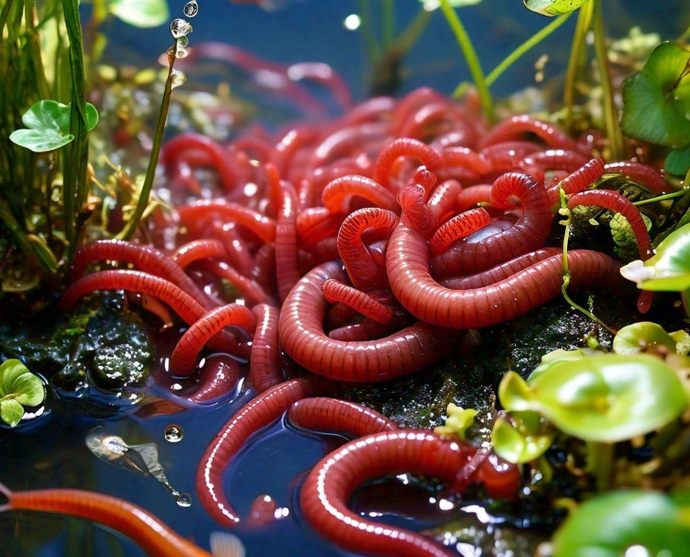Organic red worms: Best for composting
Organic red worms: Best for composting
Blog Article
Making Use Of Red Wigglers for Effective Organic Waste Disposal
These worms not only improve waste disintegration but likewise produce valuable worm castings, which can substantially boost dirt health. Recognizing the nuances of setting up a successful worm bin and preserving an optimum environment is essential for optimizing their advantages.
Advantages of Making Use Of Red Wigglers
Among one of the most engaging advantages of making use of red wigglers for natural garbage disposal is their impressive performance in composting. These worms, scientifically known as Eisenia fetida, are particularly adapted for breaking down organic materials, enabling them to process waste up to twice their body weight each day. This rapid decay not only speeds up the composting process but also produces nutrient-rich worm castings that considerably improve soil quality.
Additionally, red wigglers contribute to a decrease in land fill waste. By drawing away natural products from land fills, they aid lessen methane discharges-- a potent greenhouse gas. This environmental benefit is vital in the battle against climate adjustment.
In addition, red wigglers are low-maintenance and can prosper in different environments, making them available for both beginner and skilled composters. Their ability to reproduce promptly makes sure a consistent population, facilitating ongoing waste handling.
Establishing Your Worm Bin
Creating an efficient worm bin is essential for maximizing the advantages of composting with red wigglers. Guarantee the container has sufficient water drainage openings to protect against excess dampness, as red wigglers flourish in a wet but not soaked atmosphere.
(red worms)Next, prepare the bedding material, which offers as the worms' environment and food resource. The bin should be positioned in a dark, temperature-controlled location, ideally between 55 ° F and 77 ° F, to keep worm task.
When the bin is established up, introduce the red wigglers, permitting them to accustom to their brand-new atmosphere. A properly maintained bin will not just support the health and wellness of the worms but likewise facilitate effective disintegration of natural waste.
(red wiggler worms for sale)
What to Feed Red Wigglers
An understanding of the proper diet regimen for red wigglers is essential for preserving a healthy worm population and maximizing composting performance. These products not only provide important nutrients but additionally contribute to the moisture equilibrium within the worm bin.
It is essential to avoid particular foods that can damage the worm population. Red wigglers should not be fed meat, milk products, oily foods, or processed things, as these can draw in parasites and develop undesirable odors. red wigglers. In addition, citrus fruits and hot foods need to be lessened, as their acidity can be detrimental to worms
Keeping an eye on the worm container for food consumption prices will certainly help make certain that red wigglers are getting an appropriate diet regimen while maintaining an effective composting setting. Proper feeding methods are crucial for promoting a prospering ecosystem within the worm bin.
Preserving Your Worm Environment
A well-kept worm habitat is necessary for the wellness and performance of red wigglers. To make sure ideal conditions, it is important to keep an eye on temperature level, dampness, and oygenation within the worm you can try here bin (red wigglers).
A good guideline of thumb is to maintain dampness at around 70% to 80%. If the bed linens ends up being too damp, it can lead to anaerobic conditions that are hazardous to the worms.

Using Worm Castings in Horticulture
Rich in nutrients and valuable microorganisms, worm castings act as an exceptional organic fertilizer for gardening. Produced with the digestion procedures of red wigglers, these spreadings consist of a variety of crucial nutrients, consisting of nitrogen, phosphorus, and potassium, which advertise robust plant growth. Unlike synthetic fertilizers, worm castings offer a slow-release device, making certain that nutrients are readily available to plants over a prolonged duration, consequently minimizing the danger of nutrient leaching and soil depletion.
Along with nutrition material, worm castings boost dirt structure and oygenation, boosting wetness retention and drainage. The microbial life present in worm castings helps to subdue microorganisms and promotes a healthy and balanced soil ecosystem, additional profiting plant wellness. When incorporated right into the soil or made use of as a top clothing, worm castings can dramatically boost seed germination rates, root advancement, and overall plant vitality.
For optimum results, garden enthusiasts ought to apply worm castings at a rate of 1-2 inches per square foot, blending them into the dirt or incorporating them into potting blends. Overall, utilizing worm castings is an environmentally friendly strategy to enriching soil fertility and ensuring flourishing yard environments.
Final Thought

Report this page